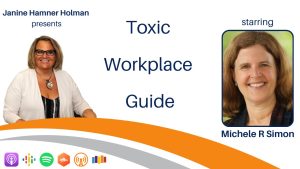
Have you noticed that there’s a LOT of talk these days about toxic workplaces? Ever wonder why? In this episode, Janine Hamner Holman sits down with Michele Simon, an expert in helping people manage through, and often decide to leave, toxic workplaces. Both Janine and Michele share personal stories about being in toxic work environments, how they managed, and how they eventually left and healed. Tune in to watch or listen.
GUEST: Michele Simon | LinkedIn | Twitter
HOST: Janine Hamner Holman | Janine@JandJCG.com | LinkedIn, Facebook, Instagram, and YouTube
What am I paying attention to today? The number of articles that we are seeing in the news about toxic workplaces. You know, recently, something came out again about what’s going on at Twitter.
Something came out about the way that Kanye West has been working with his people. I mean, it’s just news story after news story. Just yesterday, an article came out from the Mayo Clinic looking at ways in which organizations have toxicity in them and what to do about it. The reality is that the impact of being in a toxic work environment has an impact on us physically and psychologically.
There’s all kinds of toxicity from really being bullied to microaggressions and everything in between.
I’m so excited about today’s guest, Michele Simon, who is an expert in helping people, women in particular, get out of toxic work environments.
Welcome to the show, Michele!
Thank you for having me, Janine.
You’re welcome. I am so glad to have you here with us. So, tell me, what is something that you have noticed that people are not paying attention to and what is the cost of that?
Yeah, I think you described the range of what a toxic workplace can look like well. My background is in public health and law, and I only came to this really through a personal experience of somebody who tricked me for over two years. He pretended to be my friend and then he stole everything I had built.
I think the phrase workplace bullying has been around for a while, and most people know that by the sort of typical bullying behavior like a mean boss. But what I found, based on what happened to me and talking to many others, is that mostly women have experienced this, is more covert behavior.
Miriam Webster just announced that the word of the year is gaslighting.
Oh my goodness!

Right. Which of course can occur in a lot of contexts, but it is particularly prevalent in the workplace.
Gaslighting is when you complain about something and someone says, “What are you talking about? That was your fault.” which makes you question your own reality. I think what we’re not paying attention to is all of the covert behaviors that can go on at work.
Even the word microaggression, which is often used to describe a racist or gendered remark, is minimizing the potential harm. We know that at least one-third of people in the U.S. experience some form of bullying at work.
I think the actual percentage is higher, and there is not just an emotional toll that it takes, but a physical toll. We know there’s so many connections between mental health and physical health, it’s ridiculous to even talk about them as separate, it’s really just health.
The consequences can be quite devastating. I mean, there are even a great deal of reports of suicide from people who have been bullied in some form or another over time. I’m particularly interested in the more covert behaviors that aren’t always easy to spot. In my case, it was completely behind my back.
I didn’t know what was going on until it was way too late. For other people, they may have a sense that something’s off, but again, it’s that questioning your reality that can have very negative impacts on your health and obviously on your work performance, et cetera.
I have had that sort of experience, both covert and overt. I had a boss who, I found out from other people who were in a more senior position, had been badmouthing me in senior leadership meetings that I wasn’t participating in, but I was finding it out from these friends.
It’s one of those tricky situations where I was happy to know that my boss didn’t have my back, which allowed me to have my guard up, and yet what do I do about that? She’s my boss.
When people find themselves in those sorts of situations where it really is covert, where it’s not being done directly to your face, when things are being said about you in other situations, what are effective strategies that you have become aware of? I know that you work with folks directly to help them implement strategies.
Unfortunately, when you’re on the receiving end of a smear campaign and you get an inkling of it, it’s probably already too late. There really isn’t a lot you can do, especially if your boss is directly involved in it.
When people are engaging in a whisper campaign about you, you can have a direct conversation with your boss.
I would say if you found out that your boss doesn’t have your back, there is really next to nothing you can do. The only option there could be is, if you work for a big enough company, to ask for a transfer. But every company handles that sort of thing differently.
Really at that point, the only option is to get out. Generally, what I do is I help women exit their toxic workplaces. One of my pet peeves is seeing articles like Top 10 Ways to Handle Your Toxic Boss. There really is no handling a toxic situation except to get out as quickly as possible.
Now, of course, not many people are able to just quit, and I understand that, but there definitely are, when I think of managing, short-term meditation techniques or things that you need to do to manage your day-to-day stress. I have one client whose stress escalated into a full-on physical problem.
There are standard meditation techniques, in addition to minimizing contact with the toxic person to protect yourself, to put boundaries around your time. I always start with “How many vacation days do you have?”
I just talked to a friend yesterday. She had forgotten that she had a contract when she started her job that gave her four weeks’ vacation. I asked, “How much have you taken?” And, of course not all of it.
Taking stock of what you have available to minimize your contact with these toxic people, whether it’s literally taking time off or blocking certain people from contacting you. One client has someone who just contacts her randomly all day long. And I said, “Do not answer or respond.”
Find ways to protect yourself, your boundaries, your health, while you create the exit plan to permanently get out of that situation.
I have a client with whom I have been working for a while. I did a workshop with their entire leadership team, about 128 people.
We were having this interesting conversation about what the impact on us is when we have a manager who is anywhere on that spectrum of bullying or just not very nice. It makes you want to put your head down on your desk and take a nap all day long. We discussed how it makes us feel when we are in that situation.
We had a big whiteboard with a lot of words on it including “demoralized” and “stupid” and “ineffective.” Then one person, not surprisingly, a young person said, “I would leave if I were in that situation.” To which I responded, “That’s magnificent and I’m glad that you are bringing that up.”

Right.
The reality is that I was in that kind of situation. And of course, it’s not every day all day, and there is a boiling frog thing that happens. Sometimes it’s great and everything is good and you think, “Oh, maybe it really was all my imagination,” or “It’s not that bad.” And then, of course, it goes back to being how it was.
I was in a situation like that for nine years, and the reality was that by the time I finally left, it had taken a huge toll on me physically and psychologically., I felt like I had PTSD or something else where I had lost my sense of self, my sense of self-efficacy, and my sense of being a competent human.
In that land between “I would leave. I would get up and walk out the door,” and sticking it out for nine years hoping that things would magically get better. How can we shorten the period of time that people who are in the camp like me stick around?
Well, I do think there is a growing awareness. That young person you mentioned is indicative of the next generation saying, “Yeah, I’m not taking that.” So that’s good for them.
Which is part of why it is great for them, and it is what is leading to the great resignation and the great reorganization. They are not willing to tolerate those sorts of situations.
But even beyond the younger generation, COVID obviously just laid bare so many of these problems. And now you have not only the great resignation, but the great thing is now working from home. And who can blame them?
Who wants to be in a toxic office, when at least when you’re home, you can deflect a lot of the BS that happens in the office? Although I will say there’s evidence that even virtually a lot of these especially covert kinds of power play behaviors can go on.
I remember feeling like Slack was being weaponized against me, where there’d be ganging up happening or somebody would try to embarrass me. I was quite taken aback.
It can happen both virtually and in an in-person office setting. What you described, including the PTSD, I do think it’s important to talk about the harm that can come from this type of behavior, particularly over time, as a form of trauma. I think that workplace trauma is becoming more recognized, and it is important to call it that and recognize it as that.
What can happen after you’ve experienced workplace trauma and you’re recovering, if you go too soon to the next workplace, PTSD happens. Something might trigger you. A boss might say something that feels like what your other boss said.
Even though it’s really different, you get reminded of it, you react, and then your body goes right back into that place of protection, freeze, fight, and the various reactions to feeling under threat.
It’s really important to heal from a traumatic work situation. What I always recommend, if possible, is to take time in between jobs. That’s why it’s hard to talk to someone who is in a situation and cannot quit. They can only leave by getting another job.
While I understand most people are economically in that situation, I also like to discuss the possibility of taking some time in between. Sometimes you can negotiate with a new employer, particularly if you’re at a high level or in a specialized field where they really need you. They may give you some extra time if you honestly say, “I need to be at my best for this new role. I need downtime in between.” A good employer will actually–
Understand and respect that.
Yes, a bad sign is an employer who says, “No, I’m not going to give you any time, we need you yesterday.” You don’t really even want to go into that situation. So I just really think it’s important to take the time to recover.
I’m sort of somewhere between a therapist and an attorney in how I help people, but I understand both worlds. But I also understand the need for a trained therapist, which I’m not. There is tremendous value in talking to someone who understands trauma. Not all therapists understand trauma. This is something I had to learn the hard way, so let me save you lots of time.
It wasn’t until I found the right therapist that I was truly able to heal. Also, someone who understands, if you are victimized by someone with narcissistic tendencies, which is also very common. I wound up working with someone who specializes in narcissism which was extremely helpful to understand the behavior that was behind what happened to me.
The more specialized you can find someone to help you recover from that trauma, the better. I always like to mention the potential for getting some kind of severance on your way out the door. Obviously, if they’re letting you go, then you’re in a better position to negotiate.
But even if you want to quit, sometimes it is possible to get your employer to give you severance. If there was some kind of illegal activity going on, discrimination or retaliation, then you’re in a better position.
Unfortunately, most of the behaviors we’ve been talking about, from straight up bullying to stealing your work or gaslighting are not actionable as we say in law. But what I do is I start to probe: if you’re a woman, were you paid differently than a man? Were you treated differently than men, or in another protected class?
Sometimes, oftentimes, there’s a combination of things going on. By the way, age discrimination is obviously very common, difficult to prove, but the threshold for that is just age 40.
So there’s a lot of ways to bring potential ways to threaten an employer to leverage getting some kind of severance out of the arrangement. The reason I really like to stress that goes back to what we were just talking about, to give yourself the time financially to recover from the toxic situation that you are coming from before you jump to the next job. Severance pay can help with that.
I want to bring up two things. One is part of a book that I want to introduce into this conversation, looking at some of the differences between men and women.
Before I do that though, I want to share how I left my toxic situation. Although my exit strategy was not to go out on medical leave, I knew I was in trouble and was having a hard time managing myself.
I went to my doctor and said, “I think I need to go on antidepressants.” After talking with me for a very brief time, his response was, “You actually need to go out on medical leave.” And that granted me the gift of time.

This is from the Harvard Business Review. When we talk about what’s happening with incivility in the workplace, in 1998 about 25% of people had experienced incivility in the workplace. Now it is at 99%, that’s the top number. 99% of people are experiencing incivility, again, across a whole spectrum in the workplace according to the Harvard Business Review.
So, before we get into a little bit more about the differences between men and women, do you have any thoughts on that, Michele?
Yeah, I have a couple of thoughts. There are two ways to look at that. One is, “We’ve increased.” And I think there may be some increase because in the last administration, we had this no holds barred, anything goes, and the Twitter type of crazy leadership.
I think there is a legitimate increase, but I also think that back in the day, we just didn’t really talk about it or we didn’t identify it. And maybe that word wasn’t really being used the way it is today. I think it’s probably some combination of not having identified it previously to yes, things have gotten worse.
One of the things that I find fascinating is, because I got into neurobiology and brain science about 15 years ago, our brain does not immediately distinguish between seeing something bad happening to you, and something bad happening to me.
Our brain is wired to be sensitive to “Am I safe?” Whole parts of our brain are designated to, “Am I safe?” If something bad happens to you in the workplace and I see it, I’m not even a party to it, not even your best friend at work. I just see it happening. It has an impact on me too. And I think that our sensitivity to it has also changed dramatically.
That could also work in a negative way in that fear or that sense of safety or lack of safety often means that your coworkers who you thought might come to your defense or help you don’t actually defend or help you, and instead they retreat and just protect themselves.
That’s something that affects everybody, in some way or another, who is experiencing workplace abuse. What we’re really talking about is betrayal. So I talk about the different layers of betrayal. There’s sort of the initial betrayal of, in my case, somebody who I thought I could trust turned out to be completely undermining me.
Then there’s what’s called institutional betrayal. That’s how the company responds, how your boss responds, et cetera, which usually doesn’t go very well. The third layer is your colleagues, your coworkers, who might do the right thing and speak up. But let’s be honest, most of them, most of them will not, they’re just going to abandon you, frankly.
That’s what happened to me. It’s multi-layered and that’s why, again, therapy is so important to unpack all of that.
So important and so helpful!
I want to read you a little bit here from On The Shoulders of Mighty Women by my good friend Lesley Michaels. I was asked to contribute to her book and this is from page 61 in the section that’s mine.

“In her seminal work, Mindset: The New Psychology of Success, author and researcher Dr. Carol S. Dweck writes, ‘Many females have a problem not only with stereotypes, but also with others’ opinions of them in general, they trust them too much. Girls learn to trust other people’s estimates of them. Boys are constantly being scolded and punished.
When we observed in grade school classrooms, we saw boys got eight times more criticism than girls for their conduct. Boys are also constantly calling each other slobs and morons. The evaluations therefore lose a lot of their power.’
What Dr. Dweck is pointing to is the drastically different ways in which cisgender boys and girls are socialized, both by their caregivers and by each other. Girls are praised for being cute, sweet, polite, pretty, and nice.
Through this, they learn to praise and evaluate others for these same and similar qualities. Boys are physically and verbally aggressive with each other, joke about farts and other bodily functions while calling each other names.
As a result, and as a group in which there are exceptions, women tend to be impacted more severely and deeply by harsh criticism than men. Let me be clear, men are affected too. Toxic work environments are horrible for people regardless of gender. What I am emphasizing here is that women are significantly more likely to internalize the criticism and experience it doing harm.”
A lot of your work is focused on women in particular so I thought that an important element to bring into it is that women are wired, both in our brain literally and then by society. We’re wired to be impacted in negative ways by criticism, especially when it extends over time.
What comes to the front for me is we’re also perfectionists, right? Most women are perfectionists, and we’re supposed to be good girls but we’re also supposed to be nice.
So, when we get criticized, of course we’re going to internalize it and we’re not going to speak out. We won’t defend ourselves either, right? So it’s like this awful combination of we internalize it, but we’re too nice to complain about it because if we complain–
But we’re not supposed to complain.
Right. And if we do, then of course that just creates more gaslighting and backlash. So women…
Now we’re a b!*#* and a problem!
Exactly. Yes.
So, when you work with folks to help them figure out how to get a break, how to create a transition for themselves, if there are folks who are reading this, in addition to taking care of ourselves while we’re still in this situation, in addition to reaching out to you directly and saying, “Hey, I would like to work with you. I need some help,” what are other things that people can do?
I like to recommend that you shore up your resources. So, in addition to the immediate self-care we talked about, for me it was helpful to dig back into earlier friendships in my life. I mean people with whom I was still in touch to lean on them, in addition to my partner who got me through this.
Go back to the people who really knew you when, and who really care about you and who will give you the time that you need to process what’s going on. Get out of the work environment where you really can’t trust anybody and go to the people who know you, love you, and will let you lean on them.
In addition to the professional therapist, you can’t spend all your money there. Go get your therapy for free from the people who really love you. And then, from there, other resources like pets, taking walks on the beach, or whatever nature you have near you, think about shoring up your resources to get breaks, to really give yourself that strength.
I can’t emphasize enough this idea of really leaning on people in your lives. That is really what saved me. I think we tend to think, “Oh, that person will be too busy.” You know what? Most people really are happy to help. I think just really making sure that you go to the resources that you have available to you both, professionally and personally.
I think one of the challenges for humans, and maybe especially for women, is remembering to rely on our resources. We get into, especially professional women, we get into this, “I need to be able to stand on my own. I need to be able to do it myself.” I used to have a post-it on my computer that said, “The smartest people look for their resources and ask for help.”
There you go. Yes, absolutely. And women as caregivers are always the first to be taking care of everyone else, but, you know, our energy gets drained. And you’re right, we absolutely need to allow others to take care of us when we need it.
Mm-hmm, awesome. This is my last question before we start wrapping up so if there’s other things that you want to bring in, please do. As an attorney, one of the things that we often hear is that you want to document everything. How important is that really?
It is important. I will say it’s more important where you think you have a legally actionable case, but obviously most people don’t know, who aren’t lawyers, whether they do or not. So it’s always good just when in doubt to document. And I think it’s useful, even regardless of whether you bring a case, first of all, it’s always good even if you want to ask for severance.
I always tell people, “Start with your accomplishments.” So just documenting everything that you’ve done at work in a positive way is always good to have if it’s not already available.
And then, of course, any interaction where someone’s trying to gaslight you to create evidence to the contrary. So yes, documentation is important. I don’t want people to get too crazy over it. Some people are better at it than others. But I would document key conversations.
So, if your boss said one thing that contradicted something else, certain things that you think might come in handy later on, definitely document. Then you can do the lawyer thing, which is after you have either meet in person or have a phone call, send a follow-up email summarizing what you talked about.
Although you don’t have to do that. You can also just keep a written record for yourself. You don’t have to necessarily send it via email, but depending on the situation, either one is good. So yes, I do think documentation is important, and also consulting an attorney before you think you need to.

One mistake people make is they think they only need an attorney if they’re going to sue. “No, I don’t want to sue.” Lawyers don’t only sue. Lawyers help you understand the situation that you’re in and ask the right questions and can kind of guide you on the documentation piece that you might need no matter what path you take.
And then again, when requesting severance, negotiating the terms of severance and so forth. If you have any suspicion that there’s wrongdoing going on, the other reason is retaliation is almost certain to happen. Once you complain about something, documenting potential retaliation, having a lawyer who can help you, because retaliation is absolutely illegal when it’s regarding an underlying illegal activity. These are the reasons it’s good to just consult a lawyer sooner rather than later.
Awesome. So obviously this is a challenging subject. It is a place where it can be hard for us who are survivors of these kinds of situations to talk about it. It can be hard when people are realizing, “Oh crap, I am in a bad situation and I probably need to do something about it.” And often, as you said, the only thing to do is to leave. Michele, thank you, I appreciate you for your wisdom on all of this, and also for your honesty and your authenticity and your willingness to talk about things that are difficult and challenging, and bring up lots of feelings and emotions.
Thank you for being here with us today and also for the work that you are doing, helping people get out of these situations.
My pleasure. Thank you for making the space to have these hard conversations. And I think what makes them so hard is that often we feel alone in them. And so that’s why it’s so important that we do talk about it. And I can’t tell you how many women have reached out just to thank me for a LinkedIn post, I mean, which seems so simple.
But it’s because we tend to suffer in silence so it is important to make sure people understand they are not alone. It’s not you, it’s them. Get out, move on to a healthier situation, take care of yourself. That is the most important thing.
And that’s one of the things I think can also be helpful about documenting. It can help us to see, “Okay, this really isn’t me. I’m not crazy. I’m not imagining this. There is in fact something going on here and I’m actually not the problem.”
Right, and seeing the patterns. So the first time it’s easy to dismiss, right? But as soon as you notice the second time, go back and write down that first time, because that’s when you start seeing the patterns. And that is when you absolutely realize it’s not you, it’s them.
The other thing is, again, as women in the caretaker role, I often hear, and I had this feeling too, “I can’t leave because I feel responsible for my team, or the department will just fall apart without me.” They will falter, yes. But really everything will keep going, and you can’t save the other people on your team. You know, you gotta save yourself and–
Put on your oxygen mask first.
Right. Exactly.
All right. Well, thank you again so much. This has been a wonderful, rich, and enlightening conversation.
My pleasure! Thanks so much for having me, I really enjoyed it.
It’s been my honor. I am Janine Hamner Holman, and this has been The Cost of Not Paying Attention. Remember, great leaders make great teams. Until next time.
Important Links
- Harvard Business Review
- On the Shoulders of Mighty Women, Lesley Michaels
- Mindset: The New Psychology of Success, Carol Dweck
About Michele Simon

Michele Simon is an attorney, food policy expert, author, and advocate for those experiencing workplace abuse. She is a workplace trauma survivor. She now offers legal advice and coaching services to others on how to exit a toxic workplace. She is as affiliate of the Workplace Bullying Institute (4-day training) and certified in the “4 Stages of Psychological Safety”. Simon has a master’s degree in public health from Yale University and received her law degree from the University of California, Hastings College of the Law.
Website: www.michelersimon.com/






